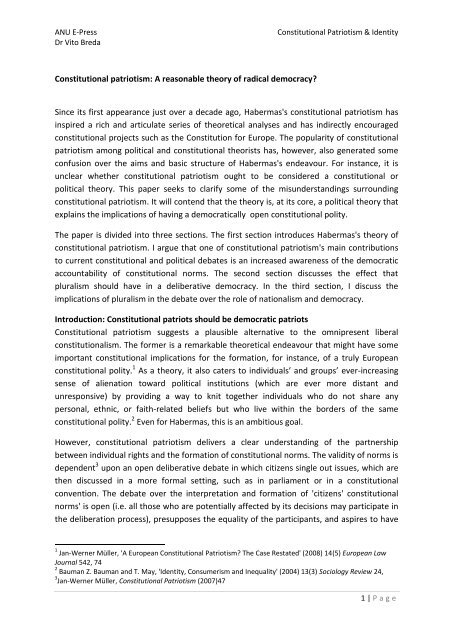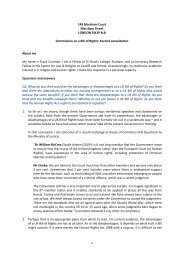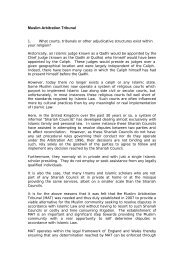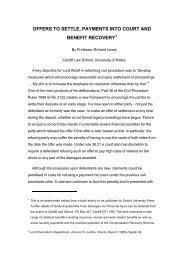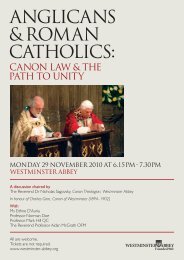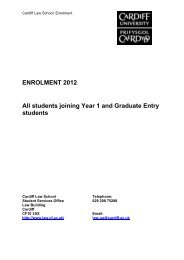Constitutional patriotism - Cardiff Law School
Constitutional patriotism - Cardiff Law School
Constitutional patriotism - Cardiff Law School
Create successful ePaper yourself
Turn your PDF publications into a flip-book with our unique Google optimized e-Paper software.
ANU E-PressDr Vito Breda<strong>Constitutional</strong> Patriotism & Identityand, at the same time, prevents those who are lacking resources from entering into apolitical debate (that is dominated by 'who' and 'to whom' narratives).The critique is accompanied by Habermas own solution, what he calls 'discursivedemocracy'. Cohen provides, I think, one of the most lucid renderings of the theory:The intuitive idea is that democracy, through its basic constitution,institutionalizes practices *…+ of free, open-ended, reflective reasoning aboutcommon affairs, and] tames and guides the exercise of coercive power byreference to those practices. To be sure, democracy does not guarantee thesubordination of the sovereign will and the coercive power it guides to [or by]the force of the better argument *…+ but it establishes conditions favorable tosuch subordination. 15What individuals lose in terms of a substantive protection of rights is compensated, inHabermas's deliberative democracy, by the increased level of rationality in thepolitical debate.At first sight, the trade-off suggested by Habermas might appear to be a relatively 'baddeal'. The substantive protection of individual rights might deliver a meagre defence againstan abuse of powers, but it might be reasonable to assume that individuals are unwilling torelinquish it. What would be the motivation for an individual to exchange a prerogative suchas the freedom of enterprise with a slightly more rational legal system? Habermas suggeststhat a side effect of a reasoned constitution system is an increase in the individual'sperception of ownership of his/her constitution. Specifically, individuals who are given theopportunity to freely select the issues that they might consider worthy of constitutionalaccommodation in a formal debate (e.g. in parliament or in a constitutional convention) willperceive decisions taken within those formal debates as representative of theirconstitutional identity. 16In this representation of democracy, Habermas outlines a consensual theory of legitimacy,according to which constitutional norms can be both rational and legitimate only whenpolitical interests are openly discussed. 17The prospect of achieving this rational legalsystem, Habermas points out, depends on, first, the partnership between an opendemocracy that guarantees the protection of the freedom of citizens to intervene in publicdebates and, second, on the equality of the speakers. These two limits ensure thatindividuals will be involved in the democratic process with the sole interest of disclosingknow, has not changed since the early days of his career—should be distinguished from his analysis of therelationship between legal systems and democracy, which has constantly evolved.15 J. Cohen, 'Reflections on Habermas on Democracy' (1999) 12(4) Ratio Juris 385, 386286 My Emphasis16 Cronin Ciaran, 'On the Possibility of a Democratic <strong>Constitutional</strong> Founding: Habermas and Michelman inDialogue' (2006) 19(3) Ration Juris 36617 Jürgen Habermas, The Theory of Communicative Action (1984)4 | P a g e
ANU E-PressDr Vito Breda<strong>Constitutional</strong> Patriotism & Identityunderstanding is that a communicative acceptance of a legal right cannot yield a conflictagainst the procedure of deliberative democracy. The idea of attaching a normative priorityof democracy to, for instance, international financial constraints is attractive, but it alsoreveals a limitation in the structure of deliberative democracy and constitutional <strong>patriotism</strong>.It might be argued, for instance, that both theories are unreasonably open.Is Habermas's deliberative democracy unreasonably open? The case of religious pluralismThe empowerment of citizens might be perceived by some as a beneficial aspect of thetheory of constitutional <strong>patriotism</strong>. It allows all members of a polity, whatever their positionin society, to promote a qualification of constitutional rights that they perceive as matchingtheir moral views, doing so without the fear of having their opinion curtailed by an imposedset of values.It is unclear, however, how a deliberative arena would decide the rational validity of anargument. According to logic, the validity of a narrative demands a rational assessment ofthe reasons that support it, but in a theory of deliberative democracy, there are no clearindications of how to assess arguments and/or their supporting reasons. 21 For instance, thetension between, on the one hand, political arguments based on religious assumptions and,on the other, their laic rebuttal is one of the debates that deliberative democracy isexpected to accommodate. 22Historically, the debate over balancing the religious perception of political values and theirlaic rendering has generated two sets of difficulties. The first has to do with whetherreligious believers are willing to consider the reasoned decisions that come from a politicaldebate as the representation of a reasoned common morality. We should expect that adeliberative democracy will solve the dilemma by asserting the separation between privateand public perceptions of rationality. In private, citizens might insist on the existence of aself-evident hierarchy of values (whatever the origin of those values might be), but it is thedemocratic process that decides how this hierarchy of values should be logically perceivedby the members of the constitutional polity.The second set of difficulties cannot be solved as quickly. The dilemma branches from thelong-term implications, for subsequent debates, of a decision regarding a hierarchy ofvalues. In a liberal democracy, for instance, the right to manifest religious beliefs is grantedby default due to a constitutional right. The extent of the right is decided by a practice thatseeks to balance the principle of equal treatment for all religions with the series ofpragmatic difficulties that a myriad of religious groups might create.21 J. Cohen, 'Reflections on Habermas on Democracy' (1999) 12(4) Ratio Juris 385, 39722 The critique is hinted in Cohen but it is fully developed in Pablo Jiminez, 'Liberal Democracy: Culture-Free?Habermas, Ratzinger & Europe' (2010) 2(1) Australian & New Zealand Journal of European Studies 44, For aarticulated analysis over the state-religious debate see for instance:Calvert John, 'Kitzmiller's Error: Defining"Religion" Exclusively Rather Than Inclusively' (2009) 3(2) Liberty University <strong>Law</strong> Review Calvert John,'Kitzmiller's Error: Defing "Religion" Exclusively Rather Than Inclusively' (2009) 3(2) Liberty University <strong>Law</strong>Review6 | P a g e
ANU E-PressDr Vito Breda<strong>Constitutional</strong> Patriotism & IdentityRosenfeld calls this form of constitutional accommodation ‘comprehensive pluralism’.Comprehensive pluralism requires that all conceptions of the good representedwithin the relevant political order be granted equal consideration, and if possibleequal accommodation. But since in any complex multicultural contemporary politicalsetting it is impossible equally to accommodate all competing conceptions of thegood, comprehensive pluralism seek to strike the best possible balance betweenidentity and difference. 23It might be argued that the present accommodation of religious beliefs is the pragmaticresult of an historically inherited compromise (and we might say that, compromises in adebate over values is a mistake), yet Habermas's deliberative democracy does not yield anappealing alternative. In his deliberative democracy, the acknowledgement of a plurality ofphilosophies of life is militantly neutral, and we are left with the sensation that pluralism isan inconvenient side effect of mass democracy. He suggests that the practice of discussingpolitical arguments should filter out irrational reasons. The issue is whether a deliberativedemocracy might accept a reasoned limit of that practice.Even if we find an agreement regarding the exclusion of religious extremism that denies thebasic principle of deliberative democracy, 24 the specific risk of Habermas's commitment torational neutrality is the possibility of turning the process into a vicious cycle in which areligious group is progressively disenfranchised from mainstream political debates. 25The critique might be downplayed. We might for instance say that in all theories, there isthe possibility of a pragmatic error in their application. It is also not unusual that such errorsmight have long term effects. However, in a political theory that seeks an alternative to theliberal model, overlooking the possible undemocratic side effects of its decisional processmight deal a fatal blow to the persuasiveness of the entire theoretical proposal. Cohen againelucidates the issue in a succinct narrative:The problem is that the discourse principle, which states, again, that practical normsare legitimate if and only if all possibly affected persons could agree to them asparticipants in rational discourses, appears to rely on a highly generic account ofreasons—not an account restricted to political argument in a democracy of equalmembers. But with no restriction on what can count as a reason, *…+ what constrainsthe ‘discursive equilibrium’ in the way that Habermas proposes? 2623 Rosenfeld Michel, 'Habermas's Call for Cosmopolitan <strong>Constitutional</strong> Patriotism in an Age of Global Terror: APluralist Appraisal' (2007) 14(2) Constellations 1, 17224 Michel Rosenfeld, 'Rethinking <strong>Constitutional</strong> Ordering in an Era of Legal and Ideological Pluralism' (2008)6(2) International Journal of <strong>Constitutional</strong> <strong>Law</strong> 415, 3425 Carlos Santiago Nino, The Constitution of Deliberative Democracy (1996)11026 J. Cohen, 'Reflections on Habermas on Democracy' (1999) 12(4) Ratio Juris 385, 3957 | P a g e
ANU E-PressDr Vito Breda<strong>Constitutional</strong> Patriotism & IdentityThe lack of restraint in Habermas's deliberative democracy is particularly unsettling if it iscompared to the protection that liberal democracies grant to the freedom to manifestdogmatic religious beliefs in political debates. ‘*T+he congress shall make no law respectingan establishment of religion. Or prohibiting the free exercise thereof; or abridging thefreedom of speech, or press’. 27 It is worth noting that the constitutional protection given toreligious groups by a comprehensive (liberal) pluralism is not necessarily neutral. In Europe,there are cases in which liberal states have an established Church that takes on the task ofprotecting a specific religion (e.g. Sweden and Norway), and other secular states maintainpreferential relationships with certain recognised religions (e.g. Germany, Poland, Italy, andAustria). Independent of how religious beliefs are constitutionally accommodated, theliberal protection of religious pluralism creates rights for individuals to manifest their beliefsin political debates.The protection of religious pluralism has a beneficial regulatory effect on liberal democracythat should be separated from its historical origin. The benefit is twofold. First, theconstitutional protection of religious pluralism increases awareness of the existence of apluralistic system of beliefs—that is, the existence of a multiplicity of religious beliefs thatyields a multitude of political argumentations. 28 Second, liberal democracy seeks apragmatic accommodation of the conflicts between these narratives and does not impose ahierarchy of values on a polity. 29 To sum up, in liberal societies, the constitutionalprotection of religious pluralism is a manifestation of a larger commitment to balance theopenness of democracy with the protection of its social diversity.However, Habermas's idea of a pluralistically neutral deliberative democracy appears tooverlook the logical necessity of balancing openness with the protection of diversity, andthat has serious implications for the internal coherence of constitution <strong>patriotism</strong>. Let meexplain this point with an analysis of the recent case of Lautsi and Others v. Italy.In the European Court of Human Rights, Lautsi challenged the compatibility of Article 118 ofRoyal Decree no. 965 of 30 April 1924, which allows crucifixes to be displayed in stateschools, with Art. 2 of Protocol n.1 and Art. 9 of the European Convention on Human Rights.Art. 2 (of Protocol n.1) instructs the signatory states to respect parents' religiouspreferences regarding the education of their children, and Art. 9 protects the freedom ofthe manifestation of religious beliefs. It is worth noting that Italy does not have anestablished Church, and the freedom of the manifestation of religious beliefs is analogous tothe one set in the Convention. The Grand Chamber of the European Court of Human Rightseventually decided in favour of Italy. In explaining the significance of Art. 2, the court statesthat:27 The Constitution of the United States, I amendment of the Constitution of the United States, 1791.28 Joshua Cohen and Charles Sabel, 'Directly-Deliberative Polyarchy' (1997) 3(4) European <strong>Law</strong> Journal 313,29 J. Cohen, 'Reflections on Habermas on Democracy' (1999) 12(4) Ratio Juris 385, 4118 | P a g e
ANU E-PressDr Vito Breda<strong>Constitutional</strong> Patriotism & IdentityAs its (Art 2) aim is to safeguard the possibility of pluralism in education, it requiresthe State, in exercising its functions with regard to education and teaching, to takecare that information or knowledge included in the curriculum is conveyed in anobjective, critical and pluralistic manner, enabling pupils to develop a critical mindparticularly with regard to religion in a calm atmosphere free of any proselytism. TheState is forbidden to pursue an aim of indoctrination that might be considered as notrespecting parents' religious and philosophical convictions. That is the limit that theStates must not exceed . 30Thus, the Court says that the right of parents to ask the state for a religious education thatmeets their beliefs (Art. 2 of protocol n.1) is trammelled at the pragmatic level by theprotection of religious pluralism. In other words, it is up to the state to find a pragmaticaccommodation for the different parents' expectations of religious education. '[T]he settingand planning of the curriculum fall within the competence of the Contracting States. In principleit is not for the Court to rule on such questions, as the solutions may legitimately vary accordingto the country and the era.' 31 As long as such an accommodation does not impose a specificphilosophy of life, the court cannot consider the state regulation to be incompatible withthe Convention. That is not to say that the crucifix is not a manifestation of religious belief.However, insomuch that state accommodation of parents' expectations does not imposethe teaching of, for instance, secularism and/or Catholicism, the Italian state has a margin ofdiscretion for setting marginal educational policies, such as those regarding the décor ofstate-run educational establishments.Lautsi and Others v. Italy is a reminder of a more general conundrum in modern massconstitutionalpolities, where different perceptions of a moral life construct differenthierarchies of values. It is also a reminder of the possibility that a state might get the'balance wrong', and so individuals are entitled to question the pragmatic decisionsregarding its accommodation of comprehensive pluralism. In this case, the Court said thatItaly had the correct balance, but this does not imply that such a balance should not berevisited in the deliberative arena or passed on to parliament for reconsideration.The ability to questioning how a state accommodates beliefs is part of the freedom ofdebating what has been historically settled by previous generations. Such a freedom mightbe rationally questioned by means of prosaic narratives (e.g. What do these people wantnext?), but its reach is proportional to the desire of a free society to pursue them. Weilerexplains the general importance of questioning the accommodation of pluralism in a liberaldemocracy.Independently of one’s view of the substantive result *…+ [there] are few long-termissues on the European agenda that are more urgent, more complex and more30 Lautsi and Others V Italy (European Court of Human Rights, Grand Chaber, Application n. 30814/06 ,18March 2011)2631 [My Emphasis] Ibid.9 | P a g e
ANU E-PressDr Vito Breda<strong>Constitutional</strong> Patriotism & Identitydelicate than the way we deal with the challenging problems of State and Church,religious minorities, the questions of collective identities of Europe and withinEurope, and the parameters of uniformity and diversity of our states and within ourstates. All these issues are encapsulated in Lautsi. 32This awareness of the possibility of revisiting previous democratic decisions thataccommodate the claims of a collective identity is missing in Habermas's rendering ofdeliberative democracy.In Habermas's deliberative arena, agreements are intended to represent their citizens, butthe presumed neutrality of such decisions might seriously hinder the possibility of ahistorical questioning. The lack of awareness of its fallibility combined with the importanceof the issues that a deliberative arena is supposed to accommodate both greatly reduce theplausibility of constitutional <strong>patriotism</strong> as an alternative to the present liberal state.<strong>Constitutional</strong> <strong>patriotism</strong>: A plausible alternative to the nation-state?<strong>Constitutional</strong> <strong>patriotism</strong> is 'leaning on' Habermas's theory of deliberative democracy, 33 yetthe openness of Habermas’s deliberative democracy is unreasonably linked to arequirement of neutrality. There is very little consideration for potential errors, and thetheory overlooks pluralism as a factual element of modern democracy. By inserting theprotection of pluralism, perhaps modelled on the liberal safeguard of freedom of faith,constitution <strong>patriotism</strong> might gain much cognitive strength.In this part of the essay, I argue that such a protection of pluralism would also reduce thepersuasiveness of Habermas's critique of the nation-state. ‘The nation-state must renouncethe ambivalent potential [the linkage between it and nationalism] that once propelled it’. 34The implausibility of the patriotic polity as an alternative to the framework of the nationstatestems again from constitutional <strong>patriotism</strong>'s lack of awareness of the democraticimplications of pluralism. However, the narrative is closer to a textual rendering ofconstitutional <strong>patriotism</strong>.Before I address the core of Habermas's narrative, a preliminary issue has to be clarified.There are strong indications that nationalism is democratically dangerous and that itsassumptions are not as rationally justifiable as those of other ideologies (let us say, forinstance, socialism or liberalism), yet in a society that values its pluralism, we cannot assumethat such a risk grants an a priori exclusion of national-identity arguments from democracy.32 Joseph Weiler EJIL Editorial Vol 21:1- Lautsi: Crucifix in the Classroom Redux, http://www.ejiltalk.org/lautsicrucifix-in-the-classroom-redux/33 Jan-Werner Müller, <strong>Constitutional</strong> Patriotism (2007)4734 Jürgen Habermas, 'The European Nation State: On the Past and Future of Sovereignty and Citizenship' inJürgen Habermas, Ciaran Cronin and Pablo De Greiff (eds), The Inclusion of the Other : Studies in PoliticalTheory (1999):105 11710 | P a g e
ANU E-PressDr Vito Breda<strong>Constitutional</strong> Patriotism & Identity<strong>Constitutional</strong> <strong>patriotism</strong> cuts across two different debates. The first debate concernsfinding the right balance between the power given to individuals (to alter their inheritedconstitution) and the concerns that such a power might create. 35 In relation to this debate,constitutional <strong>patriotism</strong> deems radical democracy to be the best method for settingconstitutional norms. The second debate concerns the element(s) of a constitution systemthat citizens might perceive as 'worth fighting for'. 36Habermas questions the plausibility of the nation-state as a believable object of attachment.He argues that the plausibility of the nation-state as a default answer to the constitutionalintegration dilemma is dependent on a balanced equilibrium between integration with anational identity and the protection of individual freedom. If the relationship between thetwo is not well adjusted, it might hinder the democratic stability of the constitutional polity.Habermas notes, for instance, that national identity and rights have to be perceived in ahierarchical relation: 'This ambivalence [the partnership between state and nation] remainsharmless as long as a cosmopolitan understanding of the nation of citizens is accordedpriority over an ethnocentric interpretation of the nation as [being] in a permanent state ofwar'. 37 The term 'war' might be too evocative here (this language is perhaps borrowed fromSchmitt), but the reference to a potential conflict between national identity and aliens is aserious concerns in a European state with limited control over internal common marketmass immigrations.Habermas notes that the key difficulty concerning the framework of the nation-state goesbeyond the pragmatic risk of accepting the nation as a model of social integration. Theframework of the nation-state assumes a partnership between two systems of values.Popular national self-consciousness provided the cultural background against which'subjects' could become politically active 'citizens'. Belonging to the nationalcommunity made possible, for the first time, a relation of solidarity between personswho had previously been strangers to one another. Thus the achievement of thenation-state consisted in solving two problems at once: it made possible a new modeof legitimation based on a new more abstract form of social integration. 38On the one hand, a polity needs a system of state institutions. Legitimate state institutionsare a factual necessity of any large group of individuals that seeks to pursue a commonenlightened project. On the other hand, the nation is a concept that expresses the right of35 Joshua Cohen, 'Deliberation and Democracy' in William Rehg (ed), Deliberative Democracy : Essays onReason and Politics (1997) 35, 39036 Jan-Werner Müller, <strong>Constitutional</strong> Patriotism (2007)4737 J. Habermas, 'Citizenship and National Identity: Some Reflections on the Future of Europe' (1992) 12(1)Praxis international 1, 238Jürgen Habermas, 'The European Nation State: On the Past and Future of Sovereignty and Citizenship' inJürgen Habermas, Ciaran Cronin and Pablo De Greiff (eds), The Inclusion of the Other : Studies in PoliticalTheory (1999):105 11111 | P a g e
ANU E-PressDr Vito Breda<strong>Constitutional</strong> Patriotism & Identityself-determination of a group of individuals who share a common ethnic background. Thedifferences between the two concepts are exacerbated by a globalised society, but therehas been a precarious relation between the two from the outset.Compare 'freedom' in the sense of national independence. i.e. collective selfassertionvis-à-vis to other nations, with 'freedom' in the sense of political libertiesthe individual citizen enjoys within a country; the two notions are so different inmeaning that, at a later point, the modern understanding of republican freedom cancut its umbilical links to the womb of the national consciousness which had originallygiven birth to it. 39So Habermas argues that a patriotic commitment to a constitution is a possible alternativeto the framework of the nation-state in which citizenry might be confused with ethnicmilitancy. 40 The idea of substituting an active citizenry for the framework of a nation-statemight be quite appealing among pro-European elites who are seeking an elusive commonidentity. However, the conclusion is not convincing. Habermas assumes that the partnershipbetween national identity and liberal values is confusing and can be politically manipulated.We have to distinguish a factual difficulty of separating the internal structure of nationalism(and the risk associated with it) from the range of political commitments that a nationalidentity might bring to a pluralistic democracy.In this process of assessing the internal social structure of nationalism, the most notabledistinction is the separation between what Smith calls 'ideological ethnocentric nationalismand 'polycentric nationalism'. 'For an “ethnocentric” nationalist both power and valuesinhere in his cultural group *…+ my group is the vessel of wisdom, beauty, holiness, andculture; hence power automatically belongs to my group'. 41 An example of this form ofideological nationalism is the one that afflicted the former Yugoslavia during the war inBosnia. 42 Smith suggests that this form of nationalism contains the general characteristics ofancient and mediaeval communities that claim there is a linkage between the nationalgroup and divinity. 43In contrast, the second variety of nationalism considers a nation to be an ensemble ofdifferent groups. 'Polycentric' 44 nationalism perceives other nationalities as equal, and ittries to join different nations in a family of nations. Polycentric nationalism appeared after39J. Habermas, 'Citizenship and National Identity: Some Reflections on the Future of Europe' (1992) 12(1)Praxis international 1, 440 Ibid 341 Anthony D. Smith, Theories of Nationalism (1971)15842 See Michael Ignatieff, Blood & Belonging : Journeys into the New Nationalism (1994) For a theoreticalrendering of some of the problems that might have triggered the civil war, see, for instance: Miodrag A.Jovanovid, 'Recognizing Minority Identities through Collective Rights' (2005) 27(2) Human Rights Quarterly 625,43 Anthony D. Smith, Theories of Nationalism (1971)15844 Ibid (12 | P a g e
ANU E-PressDr Vito Breda<strong>Constitutional</strong> Patriotism & Identitythe French Revolution, and it is a 'mutation' of the sociological nature of nationalism.Polycentric nationalism adds three features to the old ethnocentric nationalism. Firstly,modern nationalism is an autonomous political movement that does not need to link itselfto divinity (as ethnocentric nationalism does) in order to demand the protection of itspolitical rights. Secondly, it claims that each nation has its own distinct sociologicalcharacteristics. The protection of these cultural features provides the theoretical supportsfor its political claims. Given that these sociological aspects vary, different nations havedifferent claims. Thirdly, modern nationalism recognises the existence of equal rights amongdifferent nations. The acknowledgment of the existence of other groups with their ownclaims makes modern nationalism respectful of the aforementioned comprehensive idea ofpluralism. 45In contrast with Smith, Habermas focuses exclusively on the potentially destabilising ethnicelement of nationalism. In Habermas all nations are inherently dangerous and directlyconnected with a history of intolerance and genocide. 46 Examples given by Habermas of lessdangerous nation-state partnerships include the American and Swiss federations. The‘average’ American or Swiss citizen might be constantly reminded of the pluralist genesis ofthe countries' constitutional assets. However, the sense of attachment to libertarianprinciples such as the freedom of speech (and other substantive rights) 47 cannot bedissociated from the practices that have incorporated those constitutional assets into ashared national image. 48 It is unclear, however, whether the U.S. and/or Switzerland couldbe considered constitutional polities that are less or more 'nationalist' in comparison to anyother European polity. The American loyalty to constitutional values is, for instance,understood by Americans as a national asset, not as a protection of universal constitution. 49A more convincing theory of constitutional <strong>patriotism</strong> would suggest a close monitoring ofthe partnership between national identity and state rather than an a priori exclusion ofclaims based on nationalisms. In this reasonable version, constitutional <strong>patriotism</strong> is aninspirational model of social cohesion for citizens who participate in the process of settingtheir constitutional norms. It is unavoidable that such an unhinged process (that mightrequires vigilant democrats) will take some risks, and the citizen has to be made aware ofthose risks. However, the historically justified vigilance regarding the possible undemocraticeffect of nationalism or religious extremism cannot be stretched in order to exclude eitherreligion or nationalism from a deliberative democracy. Again, that would be forcing acommunity to accept neutral pluralism rather than reasonably deliberating over itsimplications.45 Rosenfeld Michel, 'Habermas's Call for Cosmopolitan <strong>Constitutional</strong> Patriotism in an Age of Global Terror: APluralist Appraisal' (2007) 14(2) Constellations 1,46 Jürgen Habermas, Between Facts and Norms : Contributions to a Discourse Theory of <strong>Law</strong> and Democracy(1996)11147 Michel Rosenfeld, The Identity of the <strong>Constitutional</strong> Subject (2010)48 Benedict Anderson, Imagined Communities : Reflections on the Origin and Spread of Nationalism (1983)49 Margaret Canovan, 'Patriotism Is Not Enough' (2000) 40/3(3) British Journal of political science 413, 42613 | P a g e
ANU E-PressDr Vito Breda<strong>Constitutional</strong> Patriotism & IdentityConclusion<strong>Constitutional</strong> <strong>patriotism</strong> is a theory of deliberative democracy that provides a rationaljustification for the partnership between citizens and their constitution. Starting from theassumption that law is a factual necessity of modern mass society, Habermas proposes atheory of deliberation in which citizens have the possibility of raising and openly discussingany issue that might have constitutional implications. These discussions, depending on theconsensus gathered, might continue in a setting that is perceived to be legally appropriatefor that specific debate. Finally, if the debates over these issues follow some essentialprocedures (e.g. respect for the equality of the speakers, an openness of the deliberationprocess, and acceptance of the best arguments), the decision reached concerning any issuewill be perceived as rational.An important side effect of the open process of deliberation is the formation of a sense ofownership of the decision taken by a deliberative arena. Intervention in the deliberativeprocess transforms individual speakers into committed citizens who perceive theirconstitutional norms as representing a commonly accepted morality. So citizens'constitutional norms are in a patriotic state not self-evident national truths or God given;rather, they are the products of an activity of critical enlistment and persuasion.This conclusion is appealing. It is appealing, at least in Europe, because constitutional<strong>patriotism</strong> cuts across two different topical debates. One debate is over the relationshipbetween state and faith. The second is over the role of national identity. In both debates,constitutional <strong>patriotism</strong> provides a narrative for a democratically driven endeavour inwhich rationality and constitutional law are married in a common, enlightening project.Are constitutional <strong>patriotism</strong>'s aspirations too good to be true? Probably yes. There is littleconcern regarding the possible implications of considering each deliberation as a set oflogical right answers to constitutional dilemmas. Given that Habermas's deliberativedemocracy lacks a set of criteria for assessing the validity of a claim, logic wants thatprevious decisions be consulted in order to reach logical solutions to constitutional debates.However, without a limit to what could be considered a legitimate reason, there is a strongpossibility that previous decisions might greatly reduce the quality and quantity of thedeliberative process. Recall that previous decisions reached through a deliberative arena areperceived as both logical and morally correct responses to a specify issue. The risk is thatthe process of open deliberation becomes so dependent on the correctness of previousdeliberations that it reproduces, rather than generates, rational decisions. The side effect ofsuch an eventuality is a progressive disfranchisement of individuals and groups whosearguments are not represented in Habermas's rational constitution.This essay tested the possible implications of Habermas's constitutional <strong>patriotism</strong> indebates concerning both the manifestation of religious beliefs in state institutions and thepartnership between nation and state in a globalised society. In both debates, the possibilitythat a religious or nationalist group might take over the political institution convinced14 | P a g e
ANU E-PressDr Vito Breda<strong>Constitutional</strong> Patriotism & IdentityHabermas to suggest an exclusion of claims based on unverifiable beliefs. However, theconclusion is posited too strongly. In modern pluralistic societies, the democraticrepresentativeness of constitutional debates depends on protecting the possibility thatarguments are constructed using different perceptions of morality. If these conceptions ofmorality are not protected, constitutional <strong>patriotism</strong> cannot expect to generate in citizens acommon sense of attachment to their constitutional norms.In conclusion, Habermas's constitutional <strong>patriotism</strong> has to be read with a grain of salt,particularly when it critiques the framework of the nation-state and religious beliefs withoutconsidering that national identities and religious groups are democratic parts of a pluralisticsociety.Reference type not supported by output styleAnderson, Benedict, Imagined communities : reflections on the origin and spread of nationalism(1983)Bauman, Z., 'Identity in the globalising world' (2001) 9(2) Social Anthropology 121Bauman, Z. and May, T., 'Identity, consumerism and inequality' (2004) 13(3) Sociology Review 24Beck, Ulrich, Power in the global age : a new global political economy (2005)Canovan, Margaret, 'Patriotism is not enough' (2000) 40/3(3) British Journal of political science 413Ciaran, Cronin, 'On the possibility of a democratic constitutional founding: Habermas and Michelmanin Dialogue' (2006) 19(3) Ration JurisCohen, J., 'Reflections on Habermas on Democracy' (1999) 12(4) Ratio Juris 385Cohen, Joshua, 'Deliberation and Democracy' in William Rehg (ed), Deliberative democracy : essayson reason and politics (1997) 35Cohen, Joshua and Sabel, Charles, 'Directly-Deliberative Polyarchy' (1997) 3(4) European <strong>Law</strong> Journal313Habermas, J., 'Citizenship and National Identity: Some reflections on the future of Europe' (1992)12(1) Praxis international 1Habermas, J., 'The European Nation-State and the Pressures of Globalization' (1999)Review 46New Left15 | P a g e
ANU E-PressDr Vito Breda<strong>Constitutional</strong> Patriotism & IdentityHabermas, Jürgen, Legitimation crisis (1976)Habermas, Jürgen, The theory of communicative action (1984)Habermas, Jürgen, The structural transformation of the public sphere : an inquiry into a category ofbourgeois society (1989)Habermas, Jürgen, Between facts and norms : contributions to a discourse theory of law anddemocracy (1996)Habermas, Jürgen, 'The European Nation State: On the past and Future of sovereignty andcitizenship' in Jürgen Habermas, Ciaran Cronin and Pablo De Greiff (eds), The inclusion of the other :studies in political theory (1999):105Habermas, Jürgen, '<strong>Constitutional</strong> Democracy: A Paradoxical Union of Contradictory Principles?'(2001) 29(6) Political Theory 766Habermas, Jürgen, The Postnational Constellation : political essays (2001)Habermas, Jürgen and Rehg, William, Between facts and norms : contributions to a discourse theoryof law and democracy (1996)Ignatieff, Michael, Blood & belonging : journeys into the new nationalism (1994)Jiminez, Pablo, 'Liberal Democracy: Culture-free? Habermas, Ratzinger & Europe' (2010) 2(1)Australian & New Zealand Journal of European Studies 44John, Calvert, 'Kitzmiller's error: defing "religion" exclusively rather than inclusively' (2009) 3(2)Liberty University <strong>Law</strong> ReviewJohn, Calvert, 'Kitzmiller's error: defining "religion" exclusively rather than inclusively' (2009) 3(2)Liberty University <strong>Law</strong> ReviewJovanovid, Miodrag A., 'Recognizing Minority Identities Through Collective Rights' (2005) 27(2)Human Rights Quarterly 625Michel, Rosenfeld, 'Habermas's Call for Cosmopolitan <strong>Constitutional</strong> Patriotism in an Age of GlobalTerror: A Pluralist Appraisal' (2007) 14(2) Constellations 1Michelman, F. I., '<strong>Constitutional</strong>ism as proceduralism: a glance at the terrain' in Emilios A.Christodoulidis and Stephen Tierney (eds), Public <strong>Law</strong> and Politics : the scope and limits ofconstitutionalism (2008) 69Müller, Jan-Werner, <strong>Constitutional</strong> <strong>patriotism</strong> (2007)Müller, Jan-Werner, 'A European <strong>Constitutional</strong> Patriotism? The Case Restated' (2008) 14(5)European <strong>Law</strong> Journal 542Nino, Carlos Santiago, The Constitution of deliberative democracy (1996)16 | P a g e
ANU E-PressDr Vito Breda<strong>Constitutional</strong> Patriotism & IdentityRosenfeld, Michel, 'Rethinking constitutional ordering in an era of legal and ideological pluralism'(2008) 6(2) International Journal of <strong>Constitutional</strong> <strong>Law</strong> 415Rosenfeld, Michel, The identity of the constitutional subject (2010)Smith, Anthony D., Theories of nationalism (1971)Tully, James, 'The Unfreedom of the Moderns in Comparison to Their Ideals of <strong>Constitutional</strong>Democracy' (2002) 65(2) Modern <strong>Law</strong> Review 20417 | P a g e


